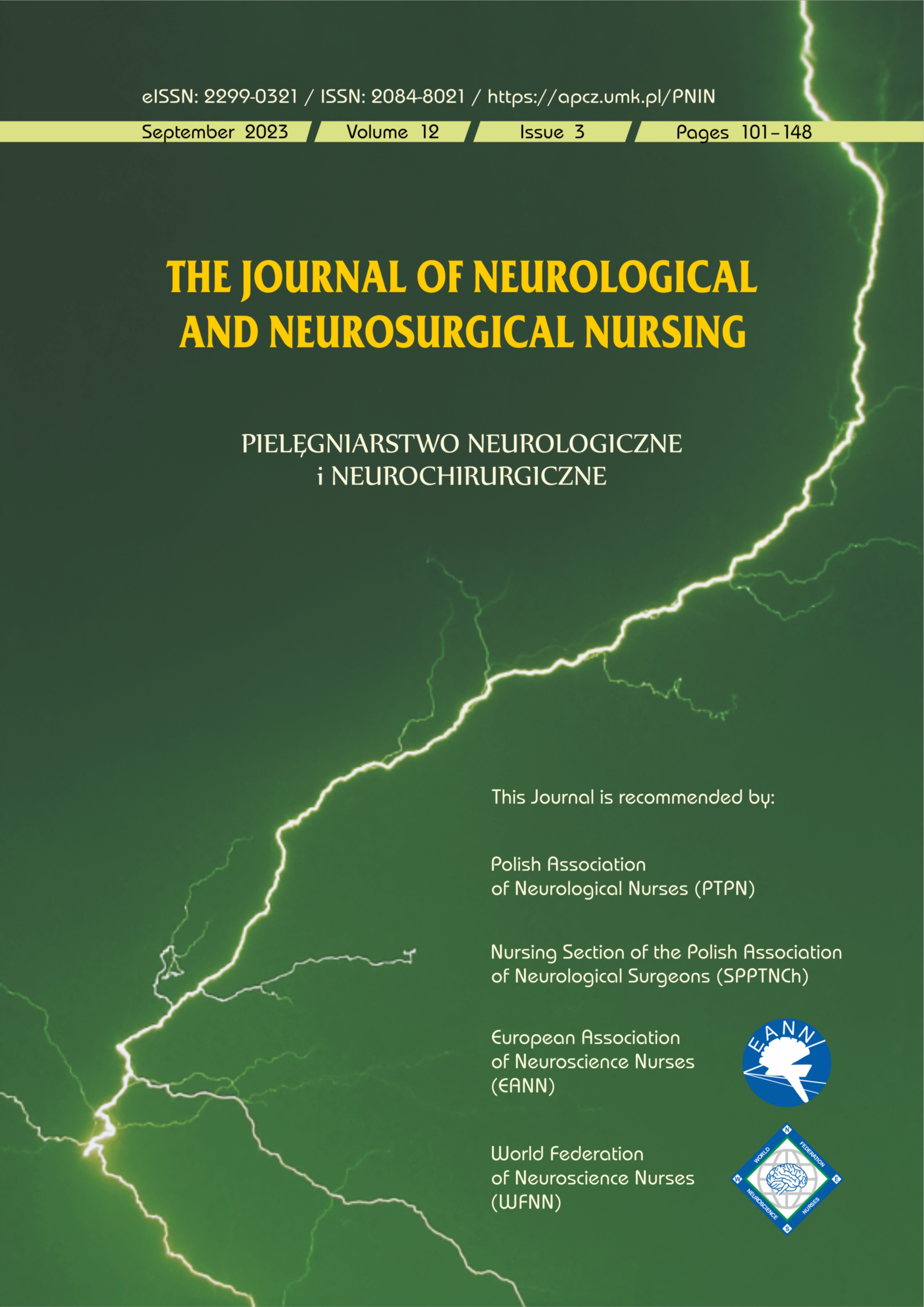Zaburzenia poznawcze i emocjonalne w przebiegu stwardnienia rozsianego – egzogenne i endogenne uwarunkowania, współczesne metody leczenia i profilaktyki
DOI:
https://doi.org/10.15225/PNN.2023.12.3.6Słowa kluczowe
zaburzenia poznawcze, zaburzenia emocjonalne, stwardnienie rozsiane, pielęgniarka, profilaktyka, leczenieAbstrakt
Stwardnienie rozsiane (SM) jest chorobą autoimmunologiczną, demielinizacyjną ośrodkowego układu nerwowego. Choroba występuje u pacjentów w różnym wieku, z częstszym występowaniem u kobiet. Etiopatogeneza SM nie jest w pełni poznana, uważa się, że autoreaktywne limfocyty odgrywają kluczową rolę w rozwoju choroby, predyspozycje genetyczne, wpływ czynników środowiskowych również ma znaczenie. Diagnoza opiera się na kryteriach McDonald’a, a choroba ma różne postaci kliniczne. Leczenie opiera się na immunomodulacji, ma na celu kontrolowanie choroby i zapobieganie nawrotom. Częstymi objawami choroby są zaburzenia motoryczne, czuciowe i poznawcze. Upośledzenie funkcji poznawczych, często występujące u pacjentów ze stwardnieniem rozsianym ma liczne konsekwencje w życiu codziennym (psychiczne, społeczne, ekonomiczne), znacznie obniżające jakość życia. Dysfunkcja psychiczno-poznawcza, mogąca wystąpić na każdym etapie choroby związana jest ze zmianami w ośrodkowym układzie nerwowym. Profilaktyka tych zaburzeń obejmuje wczesne stosowanie metod leczenia modyfikujących naturalny przebieg choroby oraz implikowanie zachowań prozdrowotnych, takich jak rzucenie palenia, właściwa dietę i wysiłek fizyczny. Leczenie farmakologiczne wykazuje ograniczoną skuteczność. Ważna jest rehabilitacja polegająca na stosowaniu strategii kompensacyjnych, metodach naprawczych ukierunkowanych na neuroplastyczność mózgu oraz i treningach poznawczych kształtujących nowe sieci funkcjonalne mózgowia. Celem pracy jest przedstawienie problematyki zaburzeń poznawczych i emocjonalnych w przebiegu stwardnienia rozsianego, ze szczególnym uwzględnieniem schorzeń endo- i egzogennych, wraz z nowoczesnymi metodami ich leczenia i profilaktyki. (PNN 2023;12(3):140–146)
Bibliografia
Hauser S.L., Cree B.A.C. Treatment of Multiple Sclerosis: A Review. Am J Med. 2020;133(12):1380–1390.e2.
Kamińska J., Koper O.M., Piechal K., Kemona H. Stwardnienie rozsiane — etiopatogeneza i możliwości diagnostyczne. Postepy Hig Med Dosw. 2017;71:551–563.
Levenson J.L. (Ed.), Textbook of Psychosomatic Medicine. The American Psychiatric Publishing, Washington–London 2006.
Król J., Szcześniak M., Koziarska D., Rzepa T. Akceptacja choroby i postrzeganie czasu u osób leczonych immunomodulacyjnie z rzutowo-remisyjną postacią stwardnienia rozsianego (RR-SM). Psychiatr Pol. 2015;49(5):911–920.
Guzik A., Kwolek A. Częstość występowania i rozmieszczenie stwardnienia rozsianego w Polsce i na świecie. Prz Med Uniw Rzesz Inst Leków. 2015;1:55–62.
Zéphir H. Progress in understanding the pathophysiology of multiple sclerosis. Rev Neurol (Paris). 2018;174(6):358–363.
Witkowski-Puchacz I., Kowalewska B. Pielęgnowanie pacjenta ze stwardnieniem rozsianym. W: Lankau A., Kondzior D., Krajewska-Kułak E. (Red.), Sytuacje trudne w ochronie zdrowia. Tom 2, Uniwersytet Medyczny w Białymstoku, Białystok 2017;310–338.
Arrambide G., Tintore M., Espejo C. et al. The value of oligoclonal bands in the multiple sclerosis diagnostic criteria. Brain. 2018;141(4):1075–1084.
Maloni H. Cognitive Impairment in Multiple Sclerosis. J Nurse Pract. 2018;14(3):172–177.
Thompson A.J., Banwell B.L., Barkhof F. et al. Diagnosis of multiple sclerosis: 2017 revisions of the McDonald criteria. Lancet Neurol. 2018;17(2):162–173.
Lassmann H. Pathogenic Mechanisms Associated With Different Clinical Courses of Multiple Sclerosis. Front Immunol. 2019;9:3116.
Gross H.J., Watson C. Characteristics, burden of illness, and physical functioning of patients with relapsing-remitting and secondary progressive multiple sclerosis: a cross-sectional US survey. Neuropsychiatr Dis Treat. 2017;|13:1349–1357.
Brownlee W.J., Hardy T.A., Fazekas F., Miller D.H. Diagnosis of multiple sclerosis: progress and challenges. Lancet. 2017;389(10076):1336–1346.
Olkiewicz J., Bonek R., Filipska K., Ślusarz R. Adherence to Therapeutic Recommendations in Patients Suffering from Multiple Sclerosis. J Neurol Neurosurg Nurs. 2020;9(3):103–107.
Filser M., Buchner A., Fink G.R., Gold S.M., Penner I.K. The manifestation of affective symptoms in multiple sclerosis and discussion of the currently available diagnostic assessment tools. J Neurol. 2023;270(1):171–207.
Bruno A., Dolcetti E., Rizzo F.R. et al. Inflammation-Associated Synaptic Alterations as Shared Threads in Depression and Multiple Sclerosis. Front Cell Neurosci. 2020;14:169.
Florkowski A., Chmielewski H., Gałecki P. Zaburzenia psychiczne w stwardnieniu rozsianym. Aktualn Neurol. 2009;9(4):264–266.
Shail M.S. Neuropsychiatry in Demyelination Disease: Using Depression as a Prodrome for Early Diagnosis and Treatment of Multiple Sclerosis. Cureus. 2017;9(11):e1813.
Oreja-Guevara C., Ayuso Blanco T., Brieva Ruiz L., Hernández Pérez M.Á., Meca-Lallana V., Ramió-Torrentà L. Cognitive Dysfunctions and Assessments in Multiple Sclerosis. Front Neurol. 2019;10:581.
Strober L., Weber E., Lequerica A., Chiaravalloti N. Surviving a global pandemic: The experience of depression, anxiety, and loneliness among individuals with multiple sclerosis. Mult Scler Relat Disord. 2022;58:103497.
Kalb R., Beier M., Benedict R.H. et al. Recommendations for cognitive screening and management in multiple sclerosis care. Mult Scler. 2018;24(13):1665–1680.
Sadeghi Bahmani D., Kesselring J., Papadimitriou M. et al. In Patients With Multiple Sclerosis, Both Objective and Subjective Sleep, Depression, Fatigue, and Paresthesia Improved After 3 Weeks of Regular Exercise. Front Psychiatry. 2019;10:265.
Carson A.J., Zeman A., Myles L., Sharpe M.C. Neurology and Neurosurgery. In Levenson J.L. (Ed.), Textbook of Psychosomatic Medicine. The American Psychiatric Publishing, Washington–London 2006;701–732.
Julian L.J. Zaburzenia funkcji poznawczych w stwardnieniu rozsianym. Neurologia po Dyplomie. 2012;7(1):21–32.
Mielnik A. Rola psychologa w procesie diagnozy i rehabilitacji osób chorych na stwardnienie rozsiane. Aktualn Neurol. 2018;18(1):27–33.
Benedict R.H.B., Amato M.P., DeLuca J., Geurts J.J.G. Cognitive impairment in multiple sclerosis: clinical management, MRI, and therapeutic avenues. Lancet Neurol. 2020;19(10):860–871.
Sandroff B.M., Motl R.W., Deluca J. The Influence of Cognitive Impairment on the Fitness-Cognition Relationship in Multiple Sclerosis. Med Sci Sports Exerc. 2017;49(6):1184–1189.
Scott B.P., Ruth A.M., Mauro G.C. Depression in multiple sclerosis. Int Rev Psychiatry. 2017;29(5):463–472.
Esposito S., Bonavita S., Sparaco M., Gallo A., Tedeschi G. The role of diet in multiple sclerosis: A review. Nutr Neurosci. 2018;21(6):377–390.
Solaro C., Gamberini G., Masuccio F.G. Depression in Multiple Sclerosis: Epidemiology, Aetiology, Diagnosis and Treatment. CNS Drugs. 2018;32(2):117–133.
Jaracz K., Domitrz I. (Red.), Pielęgniarstwo neurologiczne. Wydawnictwo Lekarskie PZWL, Warszawa 2019.
Pobrania
Opublikowane
Jak cytować
Numer
Dział
Licencja

Utwór dostępny jest na licencji Creative Commons Uznanie autorstwa – Bez utworów zależnych 4.0 Międzynarodowe.
Statystyki
Liczba wyświetleń i pobrań: 642
Liczba cytowań: 0
